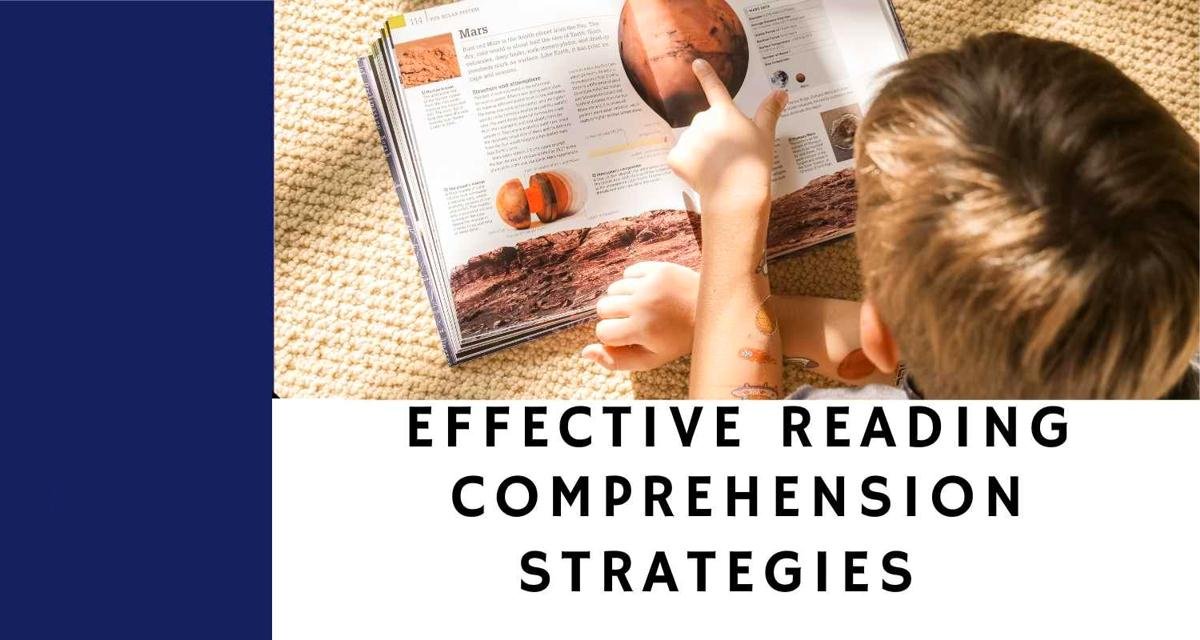Strategies for Effective Reading Comprehension: From Textbooks to Research Papers

Discover Strategies for Effective Reading Comprehension from textbooks to research papers with our comprehensive guide. Master active reading, annotating, and making connections to enhance understanding and retention of information. Improve vocabulary, time management, and focus while embracing the challenge of complex texts. Excel in academics and lifelong learning with the power of effective reading.
Reading comprehension is a fundamental skill that plays a pivotal role in learning, personal development, and academic success. Whether you’re a student trying to understand complex textbooks or a researcher delving into scholarly articles, mastering the art of effective reading comprehension is essential. In this article, we will explore various strategies that can help you enhance your reading comprehension abilities and become a more proficient reader.
Read More: 10 Ways to Encourage Reading among Students
Setting the Right Environment
Before you embark on your reading journey, it’s essential to create an ideal environment that promotes focus and minimizes distractions. Find a quiet and well-lit space where you can immerse yourself in the material without interruptions. Ensure you have all the necessary reading materials and tools, such as highlighters or sticky notes, to jot down important points as you read.
Previewing the Text
Before diving into the content, take a few moments to preview the text. Skim through the headings, subheadings, and any bolded or italicized text. This initial scan will give you an overview of the structure and main points of the material, making it easier to grasp the context while reading.
Active Reading Techniques
Passive reading can often lead to poor comprehension and retention of information. Instead, engage in active reading by asking questions as you progress through the text. Consider what you expect to learn from the material and actively search for answers within the content. Highlight essential information and take brief notes to reinforce your understanding.
Annotating and Summarizing
While reading textbooks or research papers, make use of annotations and summaries. Underline or highlight crucial points, write margin notes, and create concise summaries for each section. This process not only reinforces your memory but also helps you organize the information for future reference. Summarizing content in your own words enhances comprehension and aids long-term retention.
Making Connections
One effective way to enhance comprehension is by connecting the new information with your existing knowledge and experiences. Relating the content to real-life situations or prior learning can make complex concepts more understandable and memorable. This practice fosters a deeper understanding of the material.
Breaking Down Complex Sentences
Research papers and academic texts can often contain long and convoluted sentences. Take your time to break down such sentences into smaller, more manageable parts. Analyze the relationships between different clauses and phrases to grasp the intended meaning effectively. If necessary, read challenging sentences multiple times to ensure full comprehension.
Vocabulary Building
A robust vocabulary is a key asset in improving reading comprehension. When you encounter unfamiliar words in the text, take the time to look them up in a dictionary or contextually understand their meanings. A strong vocabulary will not only improve comprehension but also enable you to express yourself more precisely in your writing.
Time Management
Reading lengthy textbooks or research papers can be a daunting task, but effective time management can make it more manageable. Set aside dedicated reading sessions and take short breaks to maintain focus and avoid burnout. Distributing your reading over multiple sessions can lead to better comprehension and retention of information.
Avoiding Multitasking
In today’s digital age, multitasking has become a norm, but it can significantly hinder reading comprehension. Avoid multitasking, especially when dealing with complex material. Give the text your undivided attention to absorb the information effectively. Minimizing distractions is crucial for maintaining focus and understanding the content fully.
Discussing and Teaching Others
Engaging in discussions or debates about the material with classmates or peers can enrich your comprehension. Explaining what you have learned to others helps reinforce your understanding and solidify your grasp on the subject matter. Teaching others also exposes any gaps in your knowledge, prompting further learning and exploration.
Practicing Regularly
Like any skill, reading comprehension improves with practice. Regularly read a variety of texts, ranging from textbooks to research papers, to diversify your comprehension abilities. Each type of material presents unique challenges, and practicing with diverse content enhances your adaptability as a reader.
Mindfulness and Focus
Practicing mindfulness techniques while reading can significantly improve focus and concentration. Minimize distractions and be fully present in the reading process. Engage with the text actively, and if your mind starts to wander, gently redirect your attention back to the material.
Visualizing Information
Create mental images or diagrams to visualize complex information. Visualization can help you better understand abstract concepts and remember details more effectively. Associating visual representations with textual information can enhance comprehension and recall.
Reviewing and Reflecting
After completing a reading session, take a few moments to review the material and reflect on what you have learned. Identify the main takeaways and how they connect with your existing knowledge. Reflecting on the material enhances your critical thinking skills and strengthens comprehension.
Embracing Difficulties
Not all texts are easy to comprehend, especially research papers filled with technical jargon. Embrace the challenge and adopt a growth mindset. Recognize that struggling with difficult texts is a natural part of the learning process. With persistence and a positive attitude, you can develop strong reading comprehension skills.
Read More: Creating a Study Environment: Optimal Settings for Enhanced Learning
Conclusion
Adequate reading comprehension is a valuable skill that empowers you to acquire knowledge, analyze information critically, and communicate effectively. By implementing the strategies outlined in this article, you can enhance your comprehension abilities and become a more confident and successful reader.
FAQs
1. How long does it take to improve reading comprehension?
The time it takes to improve reading comprehension varies from person to person. Consistent practice and the application of effective strategies can lead to noticeable improvements over time.
2. Can reading fiction help with comprehension skills?
Yes, reading fiction can also enhance comprehension skills as it requires understanding characters, plotlines, and complex narratives.
3. Are there any reading apps that can aid comprehension?
Yes, there are several reading apps available that provide interactive features, such as highlighting, note-taking, and summarization, which can aid comprehension.
4. Is speed reading detrimental to comprehension?
Speed reading techniques can sometimes sacrifice comprehension for speed. It is essential to strike a balance between speed and understanding.
5. Can reading comprehension be improved at any age?
Yes, reading comprehension can be improved at any age. The brain’s neuroplasticity allows it to adapt and develop new skills throughout life.








One Comment